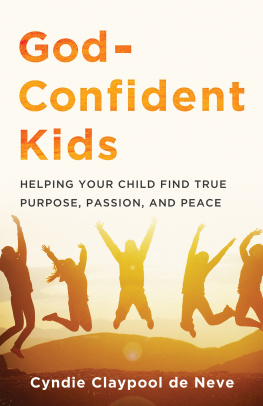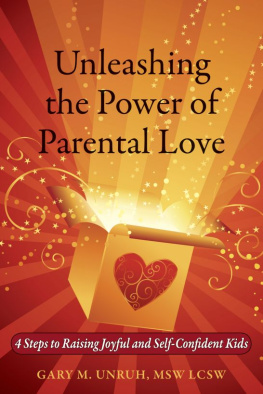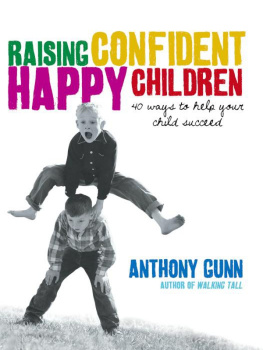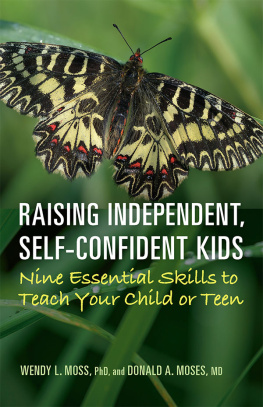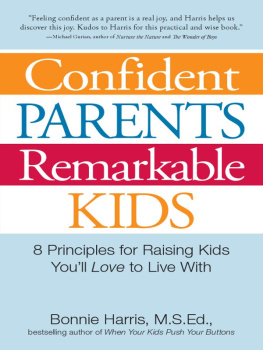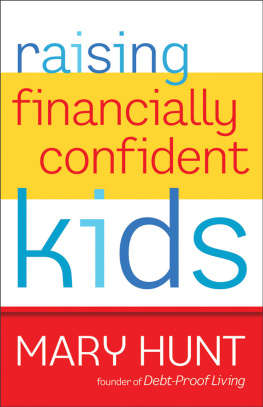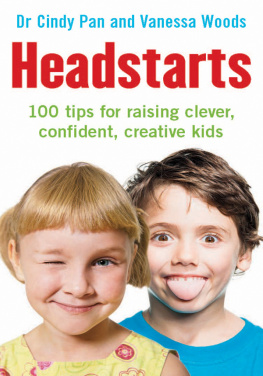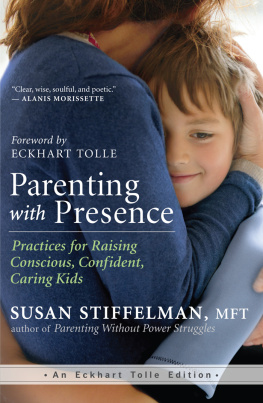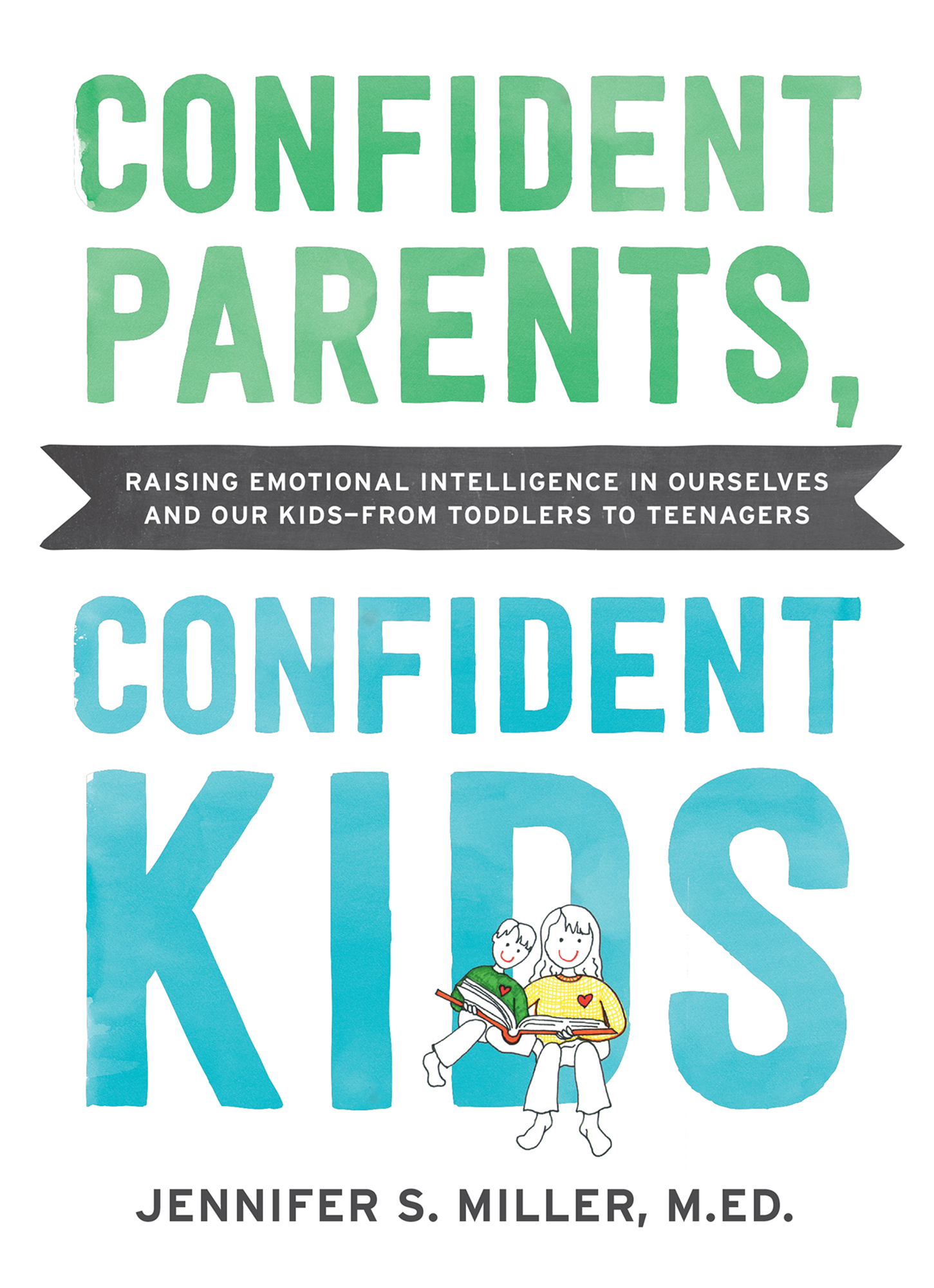With a solid tie to research, this book makes gaining confidence in parenting highly accessible and offers a million small ways parents can promote their childrens success. Where was this book when I was a new parent?
Michele Borba, Ed.D.,
author of UnSelfie and The Big Book of Parenting Solutions
We need parents who use their powerful influence to advance kids readiness for our global community. With that in mind, I have advocated for and supported social and emotional learning as fundamental to childrens success. Jennifer Millers book is an essential guide for helping parents hone their own social and emotional skills while helping their children do the same.
Tim Ryan,
United States Congressman (OH-13) and author of A Mindful Nation and The Real Food Revolution
Jennifer Miller is a world-class expert in how to parent effectively. This book is very informative, and I encourage parents to read and re-read over the years as your children grow up. Jennifer provides perspectives and practical strategies that will make parenting experiences more enjoyable. They will also help parents to raise happy, caring, responsible, and successful children.
Roger Weissberg,
Leading Scientist in Childrens Social and Emotional Development, Chief Knowledge Officer for the Collaborative for Academic, Social, and Emotional Learning (CASEL), and Distinguished Professor of Psychology and Education at the University of Illinois at Chicago
CONFIDENT PARENTS,
CONFIDENT KIDS
RAISING EMOTIONAL INTELLIGENCE IN OURSELVES AND OUR KIDSFROM TODDLERS TO TEENAGERS
Jennifer S. Miller, M.Ed.

INTRODUCTION
One day, my two-year-old son didnt want to stop playing. I had declared we needed to leave for an event. Red-faced and frustrated, angry and defiant, he lashed out with a mini-whack at my legs. I stared at him, shocked and dumbstruck while trying to hold back tears.
When he hit, I wanted to shrink away and cry. I felt hurt, like I had been punished. I also felt panicked. What if hes going to become a violent person? How could I face that? To further complicate my mounting emotional mess, I scolded myself because I knew these couldnt be honest predictions of his future. I thought, How can I possibly react well to him in this situation when I feel so confused? On top of this mash-up of hurt, panic, and guilt, I was frustrated because what I was feeling seemed irrational and much bigger than the situation actually merited. The diligent student of child development in me knew that my son did not have the language to express his angerwhich is common in toddlersso he lashed out to communicate. Why was my mind not informing my heart?
In my quest to answer this question, I set out on my own reflective journey. I knew I could react better, and I became committed to figuring out how I could respond with emotional intelligence in the future. How could I create teachable moments in my parenting? My search for answers required an unpacking of my own feelings to understand why I had such a fully loaded stack of emotions to an incident that, intellectually, I knew was developmentally normalexpected evenat my sons age.
That toddler-size hit woke me up to the fact that I had a lot to learn about raising a confident kid and becoming a confident parent. Though I had educated myself about my babys physical well-being from the very moment I discovered I was pregnant, when my baby grew into a walking, talking toddler, I realized that there was much more to learn about my own emotional well-beingmy confidenceas a parent.
I was intimately aware that my reactions to my feelings in times of challenge would become my sons emotional handbook. If I yelled, he would learn to yell. If I panicked, he would learn to panic. So, I became determined to learn all I could about promoting confidence in myself so that I could feel capable of building confidence in him.
confidence
knfdns/
noun
1. the feeling or belief that one can rely on someone; firm trust. We have every confidence in you.
2. a feeling of self-assurance arising from ones appreciation of ones own abilities. Shes brimming with confidence.
Parents agreeconfident is how we want to feel and act in our relationships with our families and what we want most for our kids. Specifically, we want our children to grow a belief within themselves that they can conquer any challenge with hard work and persistence, that they can love boundlessly, that they can find their unique sense of purpose, and that they can act wisely in a complex world. Our children trust that we will look out for their care and safety and make responsible decisions on their behalf. If we want to build confidence and these beliefs in our children, we have to trust that, as we allow for greater independence, they will increase their competence at each age and stage.
Specifically, we want our children to grow a belief within themselves that they can conquer any challenge with hard work and persistence, that they can love boundlessly, that they can find their unique sense of purpose, and that they can act wisely in a complex world.
What Is Confidence?
We develop a belief in each others confidence as we demonstrate our competence. Ultimately, in order to hold that trust, we must increasingly learn to understand, accept, and express ourselves in alignment with who we are and what we deeply value, as well as understanding, accepting, and relating to othersnamely, our childrenas we seek to promote the best of who they are.
Confidence Is
Confidence can take many shapes and forms from radical self-acceptanceflaws and allto seeing the best in others, to tapping into a greater wisdom. Certainly, from culture to culture, the ways in which parents cultivate confidence in children will differ. Here are some simple examples Ive observed in which confidence is demonstrated in parents and childrens lives.
My ten-year-old son choosing to run track on a team with strangers because he loves the wind in his hair and the ability to challenge himself to go faster and farther. He chose this after years of playing baseball with all his friends and feeling the peer and community pressure that goes along with making a different choice.
A client admitting to all-consuming worries about her kids frenemies. Realizing that her fears influence how her kids learn to manage their relationships, she committed, with support from a parenting coach, to manage her anxiety and shift her reactions.
A dad, who was raised to put down sensitivity and artistic expression as a male, choosing to promote and celebrate his sons early and continued interest in dancing ballet to grow trust.
A mom known for her social connections and easy laughteras outgoing as one can beaccepting and looking for ways to honor her sons extreme introversion in their daily encounters with friends, teachers, and other parents.
A frequent commenter on the Confident Parents, Confident Kids blog recognizing and examining patterns learned from her own parents that were unhealthy and could creep into her parentingintentionally or unintentionally. She continually educates herself on positive strategies to replace punishments such as yelling and spanking, despite the fact that her immediate friends and extended family continue to perpetuate those unhealthy patterns.


